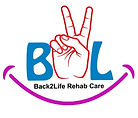Shoulder Pain and its Causes
- b2lcare

- Sep 26, 2020
- 3 min read

Pain in your shoulder can have many causes. You might injure it in a fall or accident, or you could have overdone a chore like painting. Sometimes shoulder pain comes from a condition like arthritis. It can even stem from problems in other parts of your body, which is called referred pain.
Symptoms of a Shoulder Injury
1.Ask yourself some questions to help you decide if you have a shoulder injury:
2.Can you move your arm normally, or is your shoulder too stiff or painful?
3.Do you feel like your shoulder could pop out of the socket?
4.Is your shoulder strong enough for things you normally do?
You can treat some shoulder injuries at home for a few days with rest and ice. You can bandage it to hold it in place if necessary, and elevate it above the heart. But some injuries need professional help. Here are signs that you need to see a doctor or physiotherapy right away:
1.Your shoulder joint looks deformed.
2.You can’t use your shoulder at all.
3.The pain is intense.
4.The shoulder is swelling suddenly.
5.Your arm or hand is weak or numb.
Shoulder Pain Causes and Risk Factors
Common shoulder injuries:
Dislocation:
If your shoulder is pulled back too hard or rotated too far, the top of your arm might pop out of its socket. You will feel pain and weakness in your shoulder. You may also have swelling, numbness and bruising.
Separation:
This injury affects the joint where your collarbone and shoulder blade come together. It’s called the acromioclavicular (AC) joint. A fall or hard blow tears the ligaments holding it together. If your collarbone gets pushed out of place, you’ll have a bump on top of your shoulder.
Fracture:
A bone can break or crack if you fall or take a hard hit. The most common breaks are to the clavicle (collarbone) and the humerus (arm bone closest to your shoulder). You’ll have a lot of pain and it may bruise. If your collarbone is broken, your shoulder can sag and you might not be able to lift your arm.
Cartilage tear: You can injure the cartilage (the rubbery padding) that goes around the rim of your shoulder joint. It can happen after doing the same motion over and over. You can also hurt it in a fall, or anytime your shoulder absorbs a lot of force. With this type of injury, you might feel pain when you reach over your head, and your shoulder could seem weak. It might also feel like it’s catching, locking, or grinding.
Rotator cuff tear: Your rotator cuff is the group of muscles and tendons in your shoulder that hold your arm in place and let you lift your arm up overhead. You can damage it through overuse or in a fall. It also begins to show wear and tear as you age. Your shoulder may hurt at night and when you try to lift things. You might hear a crackling sound when you move it.
Frozen shoulder: This condition limits how much your joint will move. Abnormal bands of tissue (adhesions) build up in the joint and keep your shoulder from moving freely. Your shoulder might “freeze” because pain or surgery have made you use it less, allowing the adhesions to build up.
Impingement: This happens when the tendons of the rotator cuff get pinched in the bones of the shoulder. It can cause swelling and pain. If you lift your arms over your head a lot, it can set this off.
















Comments